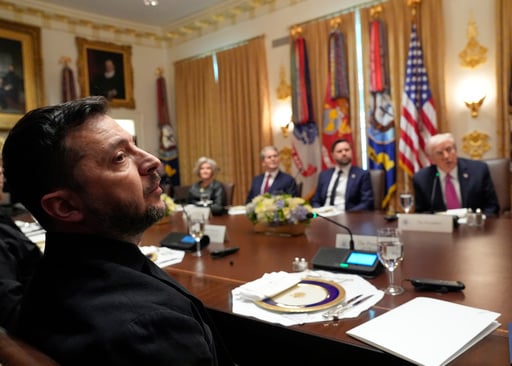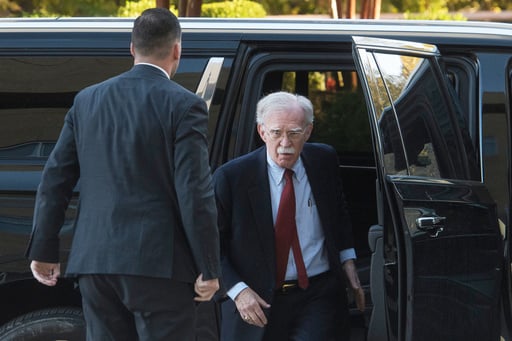Bolton is expected to surrender after indictment over his handling of classified information
WASHINGTON (AP) — John Bolton is expected to surrender to authorities Friday and make his first court appearance on charges accusing the former Trump administration national security adviser of storing top secret records at home and sharing with relatives diary-like notes that contained classified information.
The 18-count federal indictment Thursday also suggests classified information was exposed when operatives believed to be linked to the Iranian government hacked Bolton’s email account and gained access to sensitive material he had shared. A Bolton representative told the FBI in 2021 that his emails had been hacked, prosecutors say, but did not reveal that Bolton had shared classified information through the account or that the hackers had possession of government secrets.
The closely watched case centers on a longtime fixture in Republican foreign policy circles who became known for his hawkish views on American power and who served for more than a year in Trump’s first administration before being fired in 2019. He later published a book highly critical of Trump.
The third case against a Trump adversary in the past month will unfold against the backdrop of concerns that the Justice Department is pursuing the Republican president’s political enemies while at the same time sparing his allies from scrutiny.
“Now, I have become the latest target in weaponizing the Justice Department to charge those he deems to be his enemies with charges that were declined before or distort the facts,” Bolton said in a statement.
Even so, the indictment is significantly more detailed in its allegations than earlier cases against former FBI Director James Comey and New York Attorney General Letitia James. Unlike in those cases filed by a hastily appointed U.S. attorney, Bolton’s indictment was signed by career national security prosecutors. While the Bolton investigation burst into public view in August when the FBI searched his home in Maryland and his office in Washington, the inquiry was well underway by the time Trump had taken office in January.
Sharing of classified secrets
The indictment filed in federal court in Greenbelt, Maryland, alleges that between 2018 and this past August, Bolton shared with two relatives more than 1,000 pages of information about his day-to-day activities in government.
The material included “diary-like” entries with information classified as high as top secret that he had learned from meetings with other U.S. government officials, from intelligence briefings or talks with foreign leaders, according to the indictment. After sending one document, Bolton wrote in a message to his relatives, “None of which we talk about!!!” In response, one of his relatives wrote, “Shhhhh,” prosecutors said.
The indictment says that among the material shared was information about foreign adversaries that in some cases revealed details about sources and methods used by the government to collect intelligence.
The two family members were not identified in court papers, but a person familiar with the case, who spoke on condition of anonymity to discuss nonpublic details, identified them as Bolton’s wife and daughter.
The indictment also suggests Bolton was aware of the impropriety of sharing classified information with people not authorized to receive it, citing an April news media interview in which he chastised Trump administration officials for using Signal to discuss sensitive military details. Though the anecdote is meant by prosecutors to show Bolton understood proper protocol for government secrets, Bolton’s legal team may also point to it to argue a double standard in enforcement because the Justice Department is not known to have opened any investigation into the Signal episode.
Bolton’s attorney, Abbe Lowell, said in a statement that the “underlying facts in this case were investigated and resolved years ago.”
He said the charges stem from portions of Bolton’s personal diaries over his 45-year career in government and included unclassified information that was shared only with his immediate family and was known to the FBI as far back as 2021.
“Like many public officials throughout history,” Lowell said, “Bolton kept diaries — that is not a crime.” He said Bolton “did not unlawfully share or store any information.”
Controversy over a book
Bolton suggested the criminal case was an outgrowth of an unsuccessful Justice Department effort after he left government to block the publication of his 2020 book “The Room Where It Happened,” which portrayed Trump as grossly misinformed about foreign policy.
The Trump administration asserted that Bolton’s manuscript contained classified information that could harm national security if exposed. Bolton’s lawyers have said he moved forward with the book after a White House National Security Council official, with whom Bolton had worked for months, said the manuscript no longer had classified information.
In 2018, Bolton was appointed to serve as Trump’s third national security adviser. His brief tenure was characterized by disputes with the president over North Korea, Iran and Ukraine. Those rifts ultimately led to Bolton’s departure.
Bolton subsequently criticized Trump’s approach to foreign policy and government in his book, including by alleging that Trump directly tied providing military aid to Ukraine to that country’s willingness to conduct investigations into Joe Biden, who was soon to be Trump’s Democratic 2020 election rival, and members of Biden’s family.
Trump responded by slamming Bolton as a “washed-up guy” and a “crazy” warmonger who would have led the country into “World War Six.”



